Unit 5 Where did you go on vacation?复习课件(共42张PPT)鲁教版七年级英语上册
文档属性
| 名称 | Unit 5 Where did you go on vacation?复习课件(共42张PPT)鲁教版七年级英语上册 |
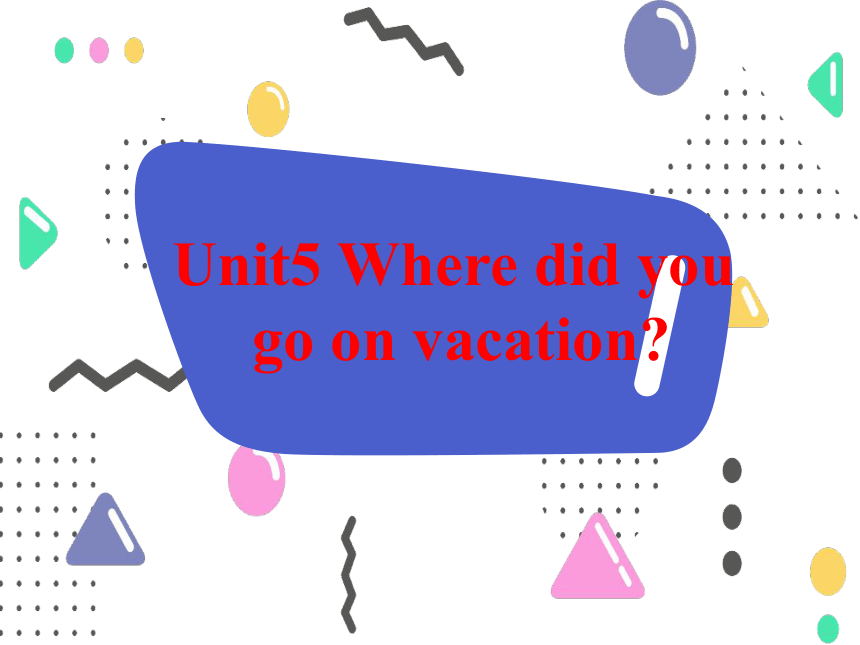
|
|
| 格式 | pptx | ||
| 文件大小 | 1007.0KB | ||
| 资源类型 | 教案 | ||
| 版本资源 | 鲁教版 | ||
| 科目 | 英语 | ||
| 更新时间 | 2023-11-16 15:42:24 | ||
图片预览


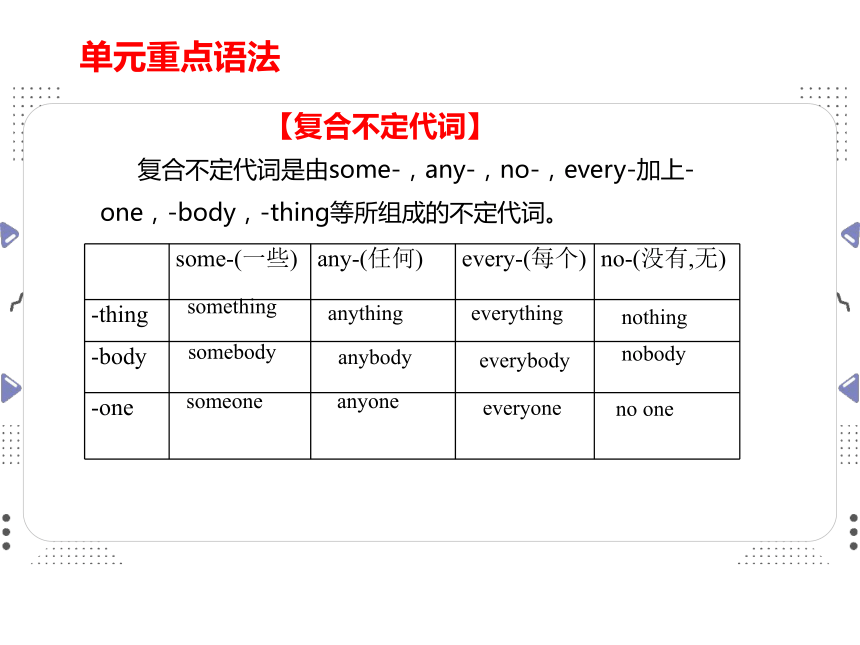
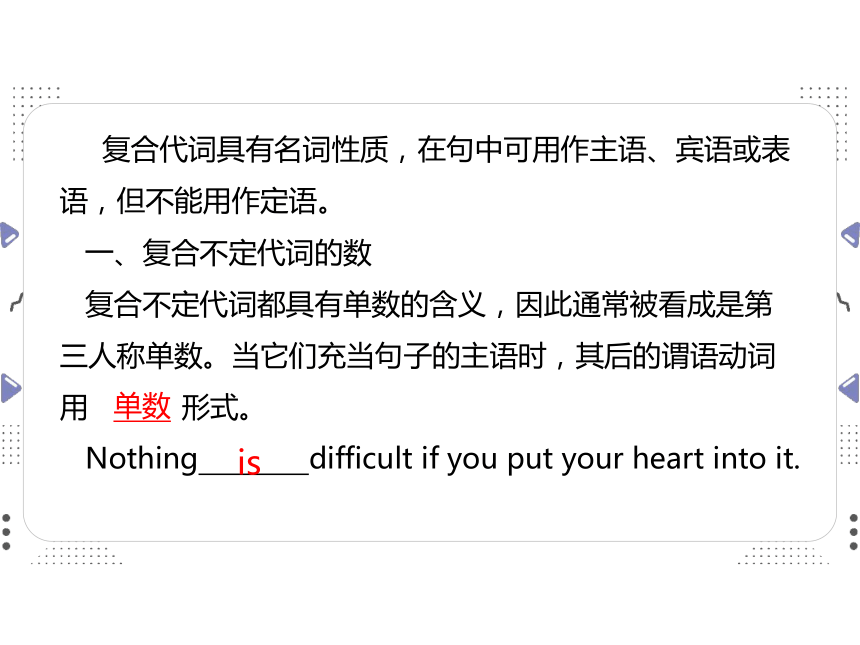
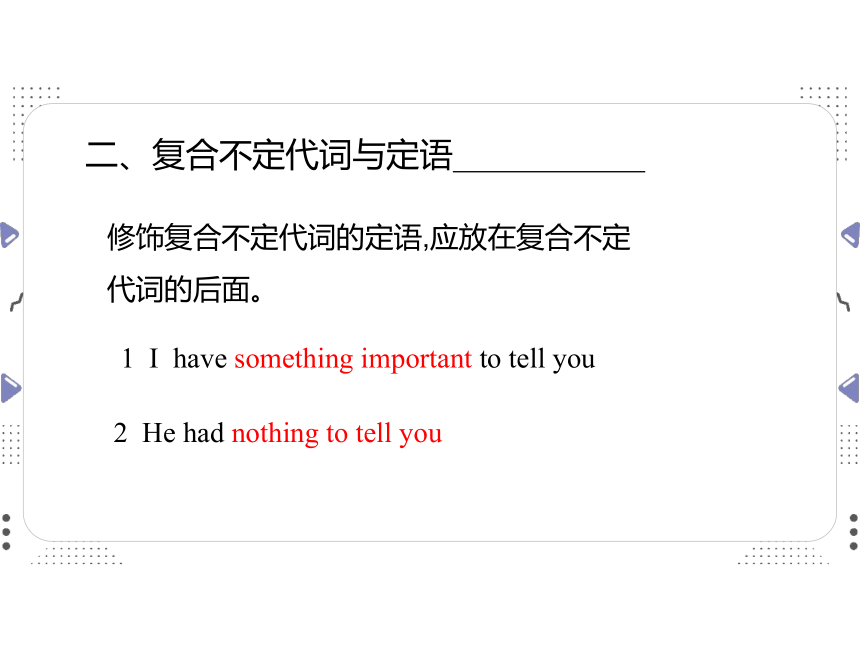
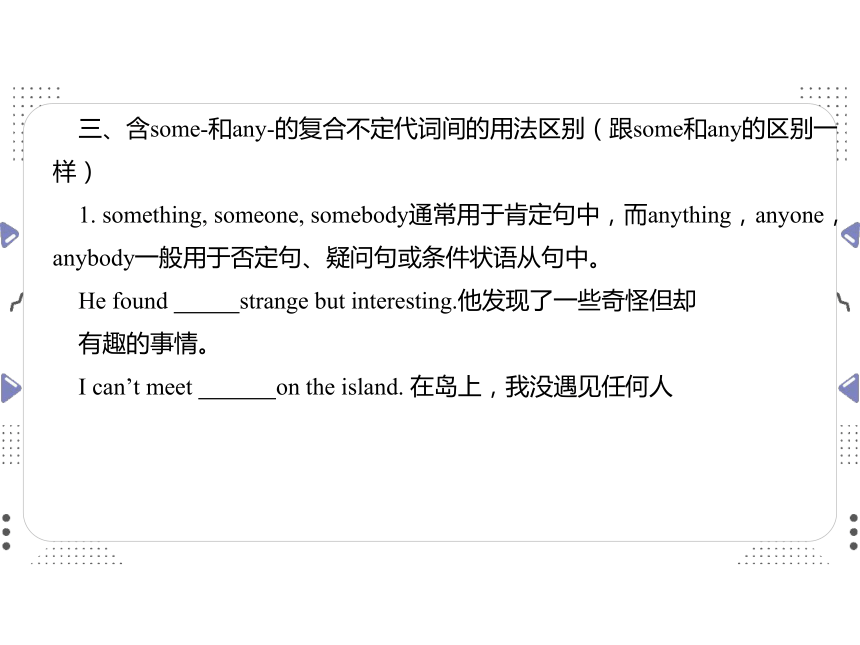
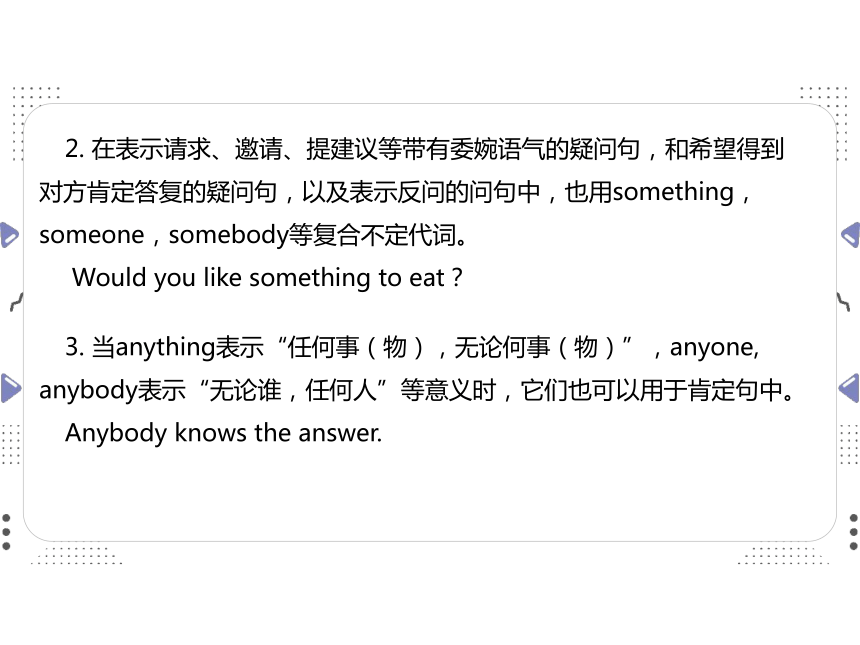
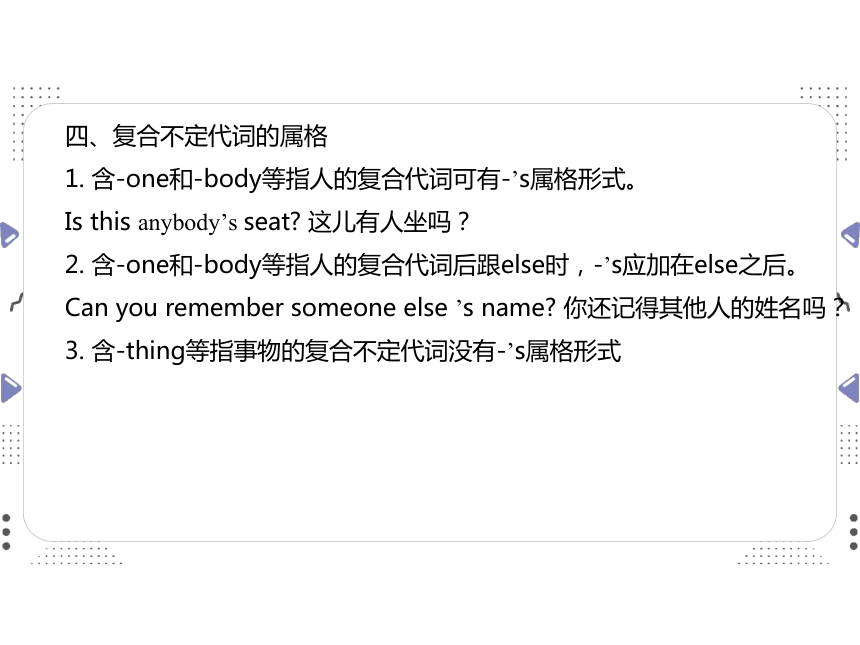
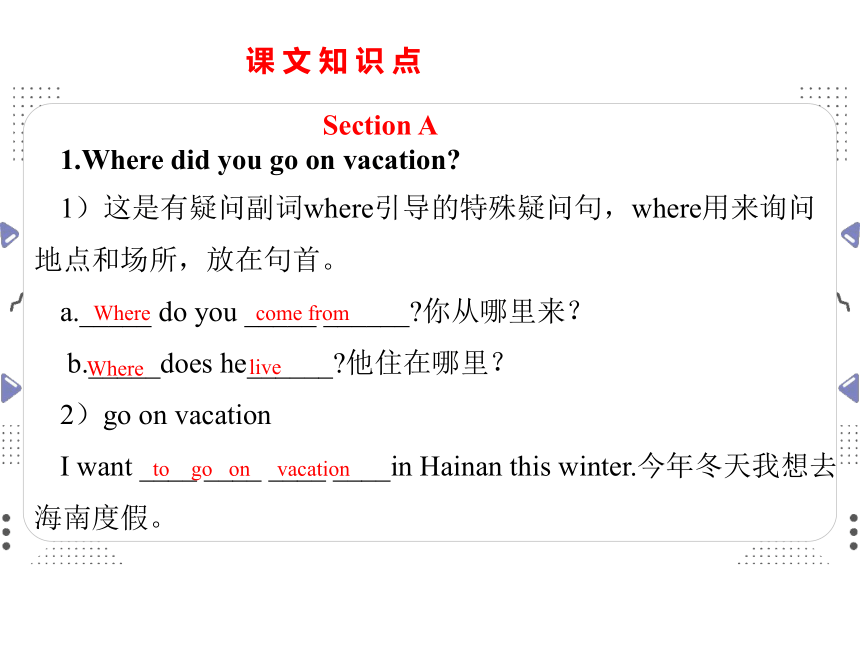
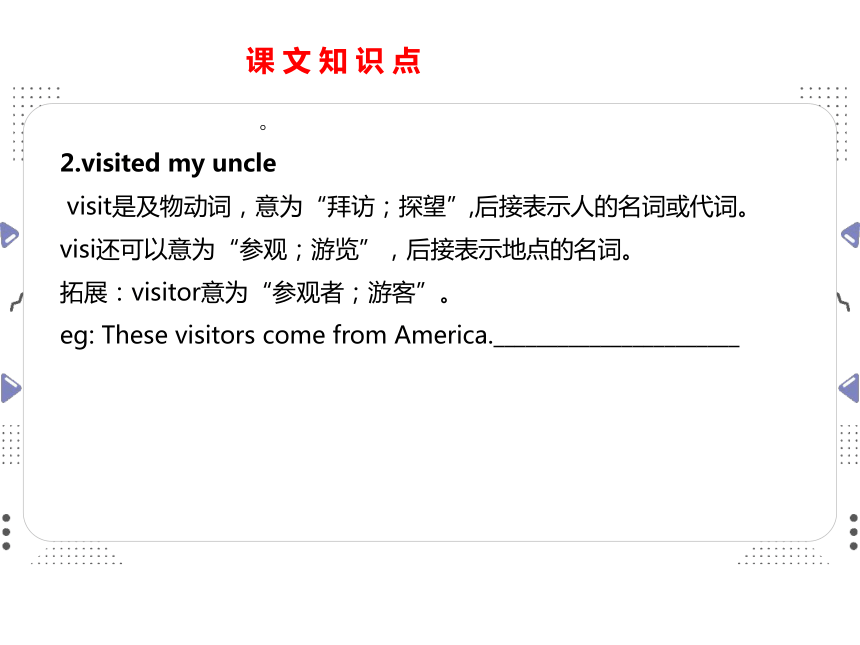
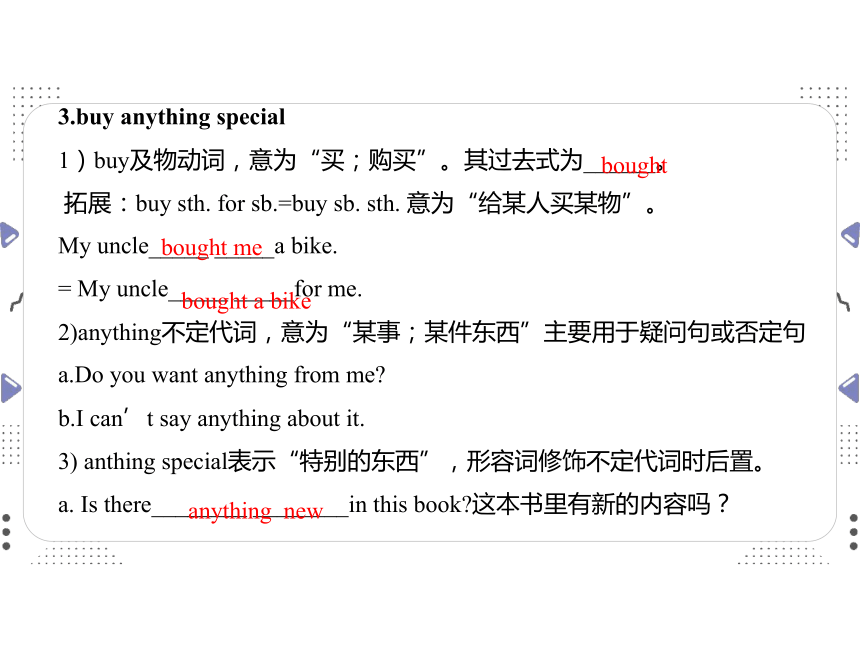
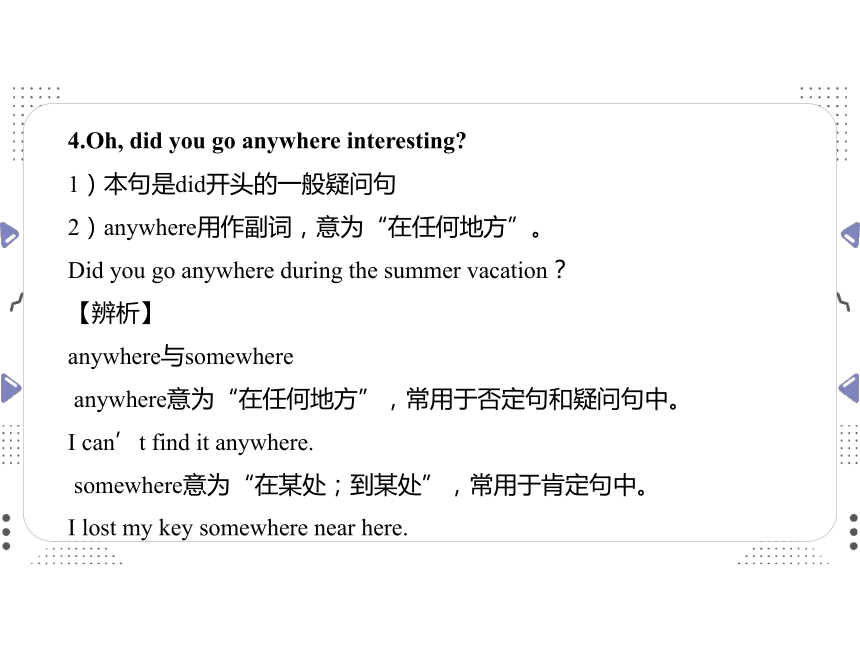
文档简介
(共42张PPT)
Unit5 Where did you go on vacation
根据首字母及句意完成单词
1. There are a lot of tall b__________ in BeiJing.
2. We __________ (决定) to visit museums this summer.
3. The students have quite a few _________ (活动) after class.
4. I didn’t take an u ____________ so I got wet yesterday .
5. The twins look the same, but there are also some d _________between them.
6.Did you go __________ (somewhere) interesting
7. They left their job because they were ___________ ( bore ).
8. I didn’t buy anything for ____________(my) yesterday.
uildings
decide
activities
mbrella
ifferences
anywhere
boring
myself
课 前 诊断
【复合不定代词】
复合不定代词是由some-,any-,no-,every-加上-one,-body,-thing等所组成的不定代词。
some-(一些) any-(任何) every-(每个) no-(没有,无)
-thing
-body
-one
something
somebody
someone
anything
anybody
anyone
everything
everybody
everyone
nothing
nobody
no one
单元重点语法
复合代词具有名词性质,在句中可用作主语、宾语或表语,但不能用作定语。
一、复合不定代词的数
复合不定代词都具有单数的含义,因此通常被看成是第三人称单数。当它们充当句子的主语时,其后的谓语动词用 形式。
Nothing difficult if you put your heart into it.
单数
is
二、复合不定代词与定语
修饰复合不定代词的定语,应放在复合不定代词的后面。
1 I have something important to tell you
2 He had nothing to tell you
目录
三、含some-和any-的复合不定代词间的用法区别(跟some和any的区别一样)
1. something, someone, somebody通常用于肯定句中,而anything,anyone,anybody一般用于否定句、疑问句或条件状语从句中。
He found strange but interesting.他发现了一些奇怪但却
有趣的事情。
I can’t meet on the island. 在岛上,我没遇见任何人
目录
2. 在表示请求、邀请、提建议等带有委婉语气的疑问句,和希望得到对方肯定答复的疑问句,以及表示反问的问句中,也用something,someone,somebody等复合不定代词。
Would you like something to eat?
3. 当anything表示“任何事(物),无论何事(物)”,anyone, anybody表示“无论谁,任何人”等意义时,它们也可以用于肯定句中。
Anybody knows the answer.
目录
四、复合不定代词的属格
1. 含-one和-body等指人的复合代词可有-’s属格形式。
Is this anybody’s seat 这儿有人坐吗?
2. 含-one和-body等指人的复合代词后跟else时,-’s应加在else之后。
Can you remember someone else ’s name 你还记得其他人的姓名吗?
3. 含-thing等指事物的复合不定代词没有-’s属格形式
目录
Section A
1.Where did you go on vacation
1)这是有疑问副词where引导的特殊疑问句,where用来询问地点和场所,放在句首。
a._____ do you _____ ______ 你从哪里来?
b._____does he______ 他住在哪里?
2)go on vacation
I want ____ ____ ____ ____in Hainan this winter.今年冬天我想去海南度假。
Where
come from
Where
live
to go on vacation
课 文 知 识 点
目录
。
2.visited my uncle
visit是及物动词,意为“拜访;探望”,后接表示人的名词或代词。
visi还可以意为“参观;游览”,后接表示地点的名词。
拓展:visitor意为“参观者;游客”。
eg: These visitors come from America._______________________
课 文 知 识 点
目录
3.buy anything special
1)buy及物动词,意为“买;购买”。其过去式为______。
拓展:buy sth. for sb.=buy sb. sth. 意为“给某人买某物”。
My uncle_____ _____a bike.
= My uncle_____ _____for me.
2)anything不定代词,意为“某事;某件东西”主要用于疑问句或否定句
a.Do you want anything from me
b.I can’t say anything about it.
3) anthing special表示“特别的东西”,形容词修饰不定代词时后置。
a. Is there________ ________in this book 这本书里有新的内容吗?
bought
bought me
bought a bike
anything new
目录
4.Oh, did you go anywhere interesting
1)本句是did开头的一般疑问句
2)anywhere用作副词,意为“在任何地方”。
Did you go anywhere during the summer vacation?
【辨析】
anywhere与somewhere
anywhere意为“在任何地方”,常用于否定句和疑问句中。
I can’t find it anywhere.
somewhere意为“在某处;到某处”,常用于肯定句中。
I lost my key somewhere near here.
目录
5.We took quite a few photos there.
take photos 意为“照相;拍照”
We______ ______on the Great Wall.我们在长城上照了相。
【辨析】
quite a few与quite a little
quite a few 意为“很多;不少”,修饰可数名词复数;
quite a little 意为“很多;不少”,修饰不可数名词。
a. He stays here for _____ _____ _____days.
b.There is _____ _____ _____water in the bottle(瓶子).
took photos
quite a few
quite a little
目录
6. I just stayed at home most of the time to read and relax.
most of the time意为“大部分时间”,其中most为代词,意为“大部分;大多数”。
most of…意为“……中的大多数”,它作主语时,谓语动词取决于most of后所修饰的名词。
a. Most of us_____(be)going to the park. 我们大多数人要去公园。
b. Most of the food_____(go)bad. 大部分的食物都变质了。
are
goes
目录
7.Everything tasted really good!
taste在此为系动词,意为“尝起来”,其后接形容词构成系表结构。
The food tastes really great.食物尝起来棒极了。
8. Did everyone have a good time
have a good time = enjoy oneself = have fun 玩得开心 (+ doing)
如: We had a good time visiting the the Great Wall.
= We enjoyed ourselves visiting the the Great Wall.
= We had fun visiting the the Great Wall.
目录
9.How did you like it
How do/did you like…… 意为“你觉得……怎么样?”,用来询问对方的观点或看法,
相当于What do you think of……
eg: How do you like your new job = _____ _____ _____ _____ _____ your new job
What do you think of
目录
10.Did you go shopping
go shopping意为“去购物;去买东西”,同义短语为do some shopping.
eg: I usually go shopping on Sundays.我通常星期天去购物。
【拓展】
“go+doing”形式表示“去做某事”,用于表达从事某一体育活动或休闲活动。
go skating 去滑冰 go hiking 去远足
go sightseeing 去观光 go fishing 去钓鱼
go swimming 去游泳 go boating 去划船
目录
11.I went to a friend’s farm in the countryside with my family.
a friend’s farm是名词所有格形式。
一般情况下,表示“有生命的人或物”的名词后面加’s,表示所属关系。
eg:The red bike is Alice’s. 那辆红色的自行车是爱丽斯的。
【拓展】
名词所有格的构成:
1)单数名词词尾加’s ,复数名词词尾没有s,也要加’s
the girl’s pen女孩的钢笔 women’s shoes女鞋 on Children’s Day
目录
2)复数名词以s结尾的只加’
the students’ reading room学生阅览室 Teachers’ Day教师节
3)如果两个名词并列,并且分别有’s,则表示“分别有”;只后一个名词有一个’s,则表示“共有”:
John’s and Kate’s rooms. 约翰和凯特(各自)的房间。
Lily and Lucy’s father. 莉莉和露西的爸爸(同一个爸爸)。
4)表示无生命的名词一般以...of...构成短语,表示所有关系。
a map of China一幅中国地图 the name of the story那个故事的名字
目录
12. Still no one seemed to be bored.
1)seem意为“好像;似乎;看来”。
Everything seems easy.一切似乎很容易。
【拓展】
a. seem+adj. “看起来……”。
You seem happy today.你今天看起来很高兴。
b. seem+to do sth. “似乎,好像做某事”。
I seem to have a cold.我似乎感冒了。
目录
c. It seems/seemed+从句 “看起来好像…;似乎…”。
It seems that no one believes you.看起来好像没有人相信你。
2)辨析:bored与boring
a. bored意为“厌烦的;感到无聊的”,一般在句中修饰人。
b. boring意为“无聊的;令人厌烦的”,一般在句中修饰事或物。
eg:a. I’m ______with what he said.我对他说的话厌烦极了。
b. I find the story very_______.我发现这个故事太无聊了。
bored
boring
目录
Section B
1. What activities do you find enjoyable
1)activities是activity的复数形式,意为“活动”。
Students like outdoor activities.
2)enjoyable形容词,意为“愉快的;快乐的”。
I’m sure we will have an enjoyable vacation.
我确信我们将会有一个愉快的假期。
目录
2. I arrived in Penang in Malaysia this morning with my family.
arrive不及物动词,意为“到达”。arrive in表示到达较大的地方,如国家、省、市等;arrive at表示到达较小的地方,如机场、商店、广场、村庄等。(注:地点副词home,here,there前介词省略)
辨析:arrive in+大地点 / arrive at+小地点
get to +地点 reach+地点
I_________ (到达) school at 8:00 o’clock yesterday.
arrived
目录
3. …so we decided to go to the beach near our hotel…
decide to do sth.意为“决定做某事”。
They _____ ______ ______the museum.他们决定去参观博物馆。
拓展:decide后常跟“疑问词+动词不定式”做宾语。
He can’t decide when ______ ______(leave) 他不能决定何时动身。
decide to visit
to leave
目录
4. I felt like I was a bird. It was so exciting!
feel like意为“给……的感觉;感受到”。其后常接从句。
He feels like he is swimming. 他感觉像在游泳一样。
feel like 还可意为“想要……”,其后可接名词、代词或动名词。即:
feel like sth. 想要某物
feel like doing sth. 想要做某事
Do you feel like a cup of tea now 你现在想要一杯茶吗?
Do you feel like ______ (take) a walk in the park with me
taking
目录
【辨析】exciting与excited
exciting 意为“令人兴奋的,使人激动的”, 一般修饰某物。
excited 意为“感到兴奋的,激动的”, 一般修饰某人。
eg:a.The story is_________(exciting, excited) .
b.He told me the_______(exciting, excited)news.
c.Sarah was_______(exciting, excited)to see the singer.
exciting
exciting
excited
目录
5. There are a lot of new buildings now…
building 可数名词,意 为“建筑物;楼房”。
build 动词,“建造,建筑” 过去式:(built)
6. I wonder what life was like here in the past.
wonder此处是及物动词,意为“想知道;琢磨”。其后常接who, what, why等疑问词引导的宾语从句。
I wonder _______________.
A. the boy is who B. who the boy is
C who is the boy
B
目录
7 .I really enjoyed walking around the town.
enjoy及物动词,意为“喜爱;欣赏;享受……的乐趣”,其后接名词,代词或动名词作宾语。
a. Do you enjoy your job 你喜欢你的工作吗?
b. I enjoy reading books. 我喜欢读书。(enjoy doing sth.喜欢做某事)
【拓展】
enjoy oneself =have a good time = have fun 玩得开心 (+ doing sth.)
walk around 意为“四处走走”。
He’s just walking around the village.他只是在村庄里随便走走。
目录
8. What a difference a day makes!
difference可数名词,意为“差别,差异” ;其形容词形式为different,意为“不同的;有差异的”。
a. What is the difference between this book and that book
b. My schoolbag is different from yours. ( be different from 意为“与……不同”)
目录
9. We wanted to walk up to the top , but then it started raining a little so we decided to take the train
1)want to do sth. 意为“想要做某事”。
2)start doing sth. 意为“开始做某事”,同义短语:start to do sth.
Tom started learning English last year.
3)a little 意为“一点儿”,在句中修饰动词、形容词或副词。也可以修饰不可数名词。
a. I can draw a little, but only as a hobby.
b. It’s a little cold outside.
c. He can speak a little English.
目录
10.We waited over an hour for the train because there were too many people.
1)wait for意为“等候”,其后可接人或物。
Tom was waiting for a bus over there.
2)over介词,意为“多于;超过” ,相当于more than。
eg : My father is over 40 years old.
There are over eight hundred students in our school.
目录
3) too many意为“太多”,其后接可数名词复数。 He always has too many questions to ask me.
辨析:too many + 可数名词复数 意为“太多... ”
too much + 不可数名词 意为“太多... ”
much too + 形容词 意为“太... ”
I have ________ homework to do today.
too much
目录
11.And because of the bad weather, we couldn’t see anything below.
【辨析】because of与because
a. because of意为“因为,由于”后可接名词、代词或动名词,不能接句子。
He lost his job because of his age.
b. because意为“因为”,引导状语从句,即接句子。
I didn’t buy the shirt because it was too expensive.
目录
12. My father didn’t bring enough money
1)辨析:bring与take
bring意为“带来;拿来”, 指从别处带到说话者所在地。
take意为“拿走;带走”, 指从说话者所在地带到别处去。
2)enough 意为“足够的,充分的”
用来修饰形容词或副词,一般置于被修饰词之后。
用来修饰名词时可放在形容词前面或后面。
a. We have enough time to do our homework.
b. The box is big enough.
目录
13. …because we forgot to bring an umbrella…
【辨析】 forget to do sth.与 forget doing sth.
forget to do sth. 意为“忘记要做某事(事情还没做)”
Don’t forget to close the window.
forget doing sth. 意为“忘记做过某事(事情已经做过了)”
I forget closing the window.
目录
14. About one hour later, we stopped and drank some tea.
1)one hour later 一小时后 ; 一小时前__________________
2)stop动词,意为“停止;中断”,过去式_________
3)drink及物动词,意为“喝;饮”; 还可以作名词,意为“饮料”。
15. Did you dislike anything
dislike意为“不喜欢;厌恶”,其后可接名词、代词或动名词形式作宾语。
a. Mary ______ the hamburgers. 玛丽不喜欢汉堡包。
b. I _____ ______ computer 我不喜欢玩电脑游戏。
目录
16. Why not
why not意为“为什么不呢”,一般用在疑问句中,表示提建议;why not后面需跟动词原形。
注:“Why not + 动词原形 ” 相当于“Why don’t you+ 动词原形 ”
a. Why not go to the party with me
=Why don’t you go to the party with me 为什么不和我一起去参加聚会呢?
b._____ _____ take a walk = _____ ______ _____ take a walk 为什么不去散步呢?
Why not
Why don’t you
目录
17.Everyone in our class took a bag with some food and water.
with介词,意为“具有;带有”。 此处介词短语with some food and water作bag的后置定语。
拓展:
with作介词时的其他用法:
a.“和……一起’ I often go to school ______ my friend. 我经常和朋友们一起去上学。
b. 以(手段、材料)用(工具) Cut the apple with a knife. 用刀切苹果。
with
目录
18. My legs were so tired that I wanted to stop.
so…that… / such…that…(如此…以致)引导的结果状语从句
so+adj./adv.+that…
The little boy is so young that he cant go to school.= _________________________________
The little boy is too young to go to school.
目录
19. 常用的感叹句的结构:
1)What +adj.+ 复数名词 / 不可数名词+主语+谓语!
2)What +a/an+adj.+可数名词单数+主语+谓语!
3)How +adj. +a/an+可数名词单数+主语+谓语!
4)How+adj./adv. +主语+谓语!
1.What an interesting book it is!
= How interesting a book is! 那本书多么有趣啊!
目录
1. _____clever a girl she is!
A.Who B.What C.How D.Where
2._____important jobs they have done!
A.What B.Who C.How D.Where
3._____sweet water it is!
A.Who B.What C.Where D. How
4._____interesting the dog is!
A.Who B.What C. Where D. How
A
B
D
B
目录
20. My classmates told me to keep going, so I went on.
1)tell sb. (not)to do sth. 意为“告诉某人(不要)做某事。
The teacher ______ ______ ______ ______ the window just now. 老师刚才告诉我们擦窗户。
2)keep doing sth. 意为“继续做某事,一直做某事”。
She______ ______ TV for two hours last night. 昨晚她持续看了两个小时的电视。
told us to clean
kept watching
Unit5 Where did you go on vacation
根据首字母及句意完成单词
1. There are a lot of tall b__________ in BeiJing.
2. We __________ (决定) to visit museums this summer.
3. The students have quite a few _________ (活动) after class.
4. I didn’t take an u ____________ so I got wet yesterday .
5. The twins look the same, but there are also some d _________between them.
6.Did you go __________ (somewhere) interesting
7. They left their job because they were ___________ ( bore ).
8. I didn’t buy anything for ____________(my) yesterday.
uildings
decide
activities
mbrella
ifferences
anywhere
boring
myself
课 前 诊断
【复合不定代词】
复合不定代词是由some-,any-,no-,every-加上-one,-body,-thing等所组成的不定代词。
some-(一些) any-(任何) every-(每个) no-(没有,无)
-thing
-body
-one
something
somebody
someone
anything
anybody
anyone
everything
everybody
everyone
nothing
nobody
no one
单元重点语法
复合代词具有名词性质,在句中可用作主语、宾语或表语,但不能用作定语。
一、复合不定代词的数
复合不定代词都具有单数的含义,因此通常被看成是第三人称单数。当它们充当句子的主语时,其后的谓语动词用 形式。
Nothing difficult if you put your heart into it.
单数
is
二、复合不定代词与定语
修饰复合不定代词的定语,应放在复合不定代词的后面。
1 I have something important to tell you
2 He had nothing to tell you
目录
三、含some-和any-的复合不定代词间的用法区别(跟some和any的区别一样)
1. something, someone, somebody通常用于肯定句中,而anything,anyone,anybody一般用于否定句、疑问句或条件状语从句中。
He found strange but interesting.他发现了一些奇怪但却
有趣的事情。
I can’t meet on the island. 在岛上,我没遇见任何人
目录
2. 在表示请求、邀请、提建议等带有委婉语气的疑问句,和希望得到对方肯定答复的疑问句,以及表示反问的问句中,也用something,someone,somebody等复合不定代词。
Would you like something to eat?
3. 当anything表示“任何事(物),无论何事(物)”,anyone, anybody表示“无论谁,任何人”等意义时,它们也可以用于肯定句中。
Anybody knows the answer.
目录
四、复合不定代词的属格
1. 含-one和-body等指人的复合代词可有-’s属格形式。
Is this anybody’s seat 这儿有人坐吗?
2. 含-one和-body等指人的复合代词后跟else时,-’s应加在else之后。
Can you remember someone else ’s name 你还记得其他人的姓名吗?
3. 含-thing等指事物的复合不定代词没有-’s属格形式
目录
Section A
1.Where did you go on vacation
1)这是有疑问副词where引导的特殊疑问句,where用来询问地点和场所,放在句首。
a._____ do you _____ ______ 你从哪里来?
b._____does he______ 他住在哪里?
2)go on vacation
I want ____ ____ ____ ____in Hainan this winter.今年冬天我想去海南度假。
Where
come from
Where
live
to go on vacation
课 文 知 识 点
目录
。
2.visited my uncle
visit是及物动词,意为“拜访;探望”,后接表示人的名词或代词。
visi还可以意为“参观;游览”,后接表示地点的名词。
拓展:visitor意为“参观者;游客”。
eg: These visitors come from America._______________________
课 文 知 识 点
目录
3.buy anything special
1)buy及物动词,意为“买;购买”。其过去式为______。
拓展:buy sth. for sb.=buy sb. sth. 意为“给某人买某物”。
My uncle_____ _____a bike.
= My uncle_____ _____for me.
2)anything不定代词,意为“某事;某件东西”主要用于疑问句或否定句
a.Do you want anything from me
b.I can’t say anything about it.
3) anthing special表示“特别的东西”,形容词修饰不定代词时后置。
a. Is there________ ________in this book 这本书里有新的内容吗?
bought
bought me
bought a bike
anything new
目录
4.Oh, did you go anywhere interesting
1)本句是did开头的一般疑问句
2)anywhere用作副词,意为“在任何地方”。
Did you go anywhere during the summer vacation?
【辨析】
anywhere与somewhere
anywhere意为“在任何地方”,常用于否定句和疑问句中。
I can’t find it anywhere.
somewhere意为“在某处;到某处”,常用于肯定句中。
I lost my key somewhere near here.
目录
5.We took quite a few photos there.
take photos 意为“照相;拍照”
We______ ______on the Great Wall.我们在长城上照了相。
【辨析】
quite a few与quite a little
quite a few 意为“很多;不少”,修饰可数名词复数;
quite a little 意为“很多;不少”,修饰不可数名词。
a. He stays here for _____ _____ _____days.
b.There is _____ _____ _____water in the bottle(瓶子).
took photos
quite a few
quite a little
目录
6. I just stayed at home most of the time to read and relax.
most of the time意为“大部分时间”,其中most为代词,意为“大部分;大多数”。
most of…意为“……中的大多数”,它作主语时,谓语动词取决于most of后所修饰的名词。
a. Most of us_____(be)going to the park. 我们大多数人要去公园。
b. Most of the food_____(go)bad. 大部分的食物都变质了。
are
goes
目录
7.Everything tasted really good!
taste在此为系动词,意为“尝起来”,其后接形容词构成系表结构。
The food tastes really great.食物尝起来棒极了。
8. Did everyone have a good time
have a good time = enjoy oneself = have fun 玩得开心 (+ doing)
如: We had a good time visiting the the Great Wall.
= We enjoyed ourselves visiting the the Great Wall.
= We had fun visiting the the Great Wall.
目录
9.How did you like it
How do/did you like…… 意为“你觉得……怎么样?”,用来询问对方的观点或看法,
相当于What do you think of……
eg: How do you like your new job = _____ _____ _____ _____ _____ your new job
What do you think of
目录
10.Did you go shopping
go shopping意为“去购物;去买东西”,同义短语为do some shopping.
eg: I usually go shopping on Sundays.我通常星期天去购物。
【拓展】
“go+doing”形式表示“去做某事”,用于表达从事某一体育活动或休闲活动。
go skating 去滑冰 go hiking 去远足
go sightseeing 去观光 go fishing 去钓鱼
go swimming 去游泳 go boating 去划船
目录
11.I went to a friend’s farm in the countryside with my family.
a friend’s farm是名词所有格形式。
一般情况下,表示“有生命的人或物”的名词后面加’s,表示所属关系。
eg:The red bike is Alice’s. 那辆红色的自行车是爱丽斯的。
【拓展】
名词所有格的构成:
1)单数名词词尾加’s ,复数名词词尾没有s,也要加’s
the girl’s pen女孩的钢笔 women’s shoes女鞋 on Children’s Day
目录
2)复数名词以s结尾的只加’
the students’ reading room学生阅览室 Teachers’ Day教师节
3)如果两个名词并列,并且分别有’s,则表示“分别有”;只后一个名词有一个’s,则表示“共有”:
John’s and Kate’s rooms. 约翰和凯特(各自)的房间。
Lily and Lucy’s father. 莉莉和露西的爸爸(同一个爸爸)。
4)表示无生命的名词一般以...of...构成短语,表示所有关系。
a map of China一幅中国地图 the name of the story那个故事的名字
目录
12. Still no one seemed to be bored.
1)seem意为“好像;似乎;看来”。
Everything seems easy.一切似乎很容易。
【拓展】
a. seem+adj. “看起来……”。
You seem happy today.你今天看起来很高兴。
b. seem+to do sth. “似乎,好像做某事”。
I seem to have a cold.我似乎感冒了。
目录
c. It seems/seemed+从句 “看起来好像…;似乎…”。
It seems that no one believes you.看起来好像没有人相信你。
2)辨析:bored与boring
a. bored意为“厌烦的;感到无聊的”,一般在句中修饰人。
b. boring意为“无聊的;令人厌烦的”,一般在句中修饰事或物。
eg:a. I’m ______with what he said.我对他说的话厌烦极了。
b. I find the story very_______.我发现这个故事太无聊了。
bored
boring
目录
Section B
1. What activities do you find enjoyable
1)activities是activity的复数形式,意为“活动”。
Students like outdoor activities.
2)enjoyable形容词,意为“愉快的;快乐的”。
I’m sure we will have an enjoyable vacation.
我确信我们将会有一个愉快的假期。
目录
2. I arrived in Penang in Malaysia this morning with my family.
arrive不及物动词,意为“到达”。arrive in表示到达较大的地方,如国家、省、市等;arrive at表示到达较小的地方,如机场、商店、广场、村庄等。(注:地点副词home,here,there前介词省略)
辨析:arrive in+大地点 / arrive at+小地点
get to +地点 reach+地点
I_________ (到达) school at 8:00 o’clock yesterday.
arrived
目录
3. …so we decided to go to the beach near our hotel…
decide to do sth.意为“决定做某事”。
They _____ ______ ______the museum.他们决定去参观博物馆。
拓展:decide后常跟“疑问词+动词不定式”做宾语。
He can’t decide when ______ ______(leave) 他不能决定何时动身。
decide to visit
to leave
目录
4. I felt like I was a bird. It was so exciting!
feel like意为“给……的感觉;感受到”。其后常接从句。
He feels like he is swimming. 他感觉像在游泳一样。
feel like 还可意为“想要……”,其后可接名词、代词或动名词。即:
feel like sth. 想要某物
feel like doing sth. 想要做某事
Do you feel like a cup of tea now 你现在想要一杯茶吗?
Do you feel like ______ (take) a walk in the park with me
taking
目录
【辨析】exciting与excited
exciting 意为“令人兴奋的,使人激动的”, 一般修饰某物。
excited 意为“感到兴奋的,激动的”, 一般修饰某人。
eg:a.The story is_________(exciting, excited) .
b.He told me the_______(exciting, excited)news.
c.Sarah was_______(exciting, excited)to see the singer.
exciting
exciting
excited
目录
5. There are a lot of new buildings now…
building 可数名词,意 为“建筑物;楼房”。
build 动词,“建造,建筑” 过去式:(built)
6. I wonder what life was like here in the past.
wonder此处是及物动词,意为“想知道;琢磨”。其后常接who, what, why等疑问词引导的宾语从句。
I wonder _______________.
A. the boy is who B. who the boy is
C who is the boy
B
目录
7 .I really enjoyed walking around the town.
enjoy及物动词,意为“喜爱;欣赏;享受……的乐趣”,其后接名词,代词或动名词作宾语。
a. Do you enjoy your job 你喜欢你的工作吗?
b. I enjoy reading books. 我喜欢读书。(enjoy doing sth.喜欢做某事)
【拓展】
enjoy oneself =have a good time = have fun 玩得开心 (+ doing sth.)
walk around 意为“四处走走”。
He’s just walking around the village.他只是在村庄里随便走走。
目录
8. What a difference a day makes!
difference可数名词,意为“差别,差异” ;其形容词形式为different,意为“不同的;有差异的”。
a. What is the difference between this book and that book
b. My schoolbag is different from yours. ( be different from 意为“与……不同”)
目录
9. We wanted to walk up to the top , but then it started raining a little so we decided to take the train
1)want to do sth. 意为“想要做某事”。
2)start doing sth. 意为“开始做某事”,同义短语:start to do sth.
Tom started learning English last year.
3)a little 意为“一点儿”,在句中修饰动词、形容词或副词。也可以修饰不可数名词。
a. I can draw a little, but only as a hobby.
b. It’s a little cold outside.
c. He can speak a little English.
目录
10.We waited over an hour for the train because there were too many people.
1)wait for意为“等候”,其后可接人或物。
Tom was waiting for a bus over there.
2)over介词,意为“多于;超过” ,相当于more than。
eg : My father is over 40 years old.
There are over eight hundred students in our school.
目录
3) too many意为“太多”,其后接可数名词复数。 He always has too many questions to ask me.
辨析:too many + 可数名词复数 意为“太多... ”
too much + 不可数名词 意为“太多... ”
much too + 形容词 意为“太... ”
I have ________ homework to do today.
too much
目录
11.And because of the bad weather, we couldn’t see anything below.
【辨析】because of与because
a. because of意为“因为,由于”后可接名词、代词或动名词,不能接句子。
He lost his job because of his age.
b. because意为“因为”,引导状语从句,即接句子。
I didn’t buy the shirt because it was too expensive.
目录
12. My father didn’t bring enough money
1)辨析:bring与take
bring意为“带来;拿来”, 指从别处带到说话者所在地。
take意为“拿走;带走”, 指从说话者所在地带到别处去。
2)enough 意为“足够的,充分的”
用来修饰形容词或副词,一般置于被修饰词之后。
用来修饰名词时可放在形容词前面或后面。
a. We have enough time to do our homework.
b. The box is big enough.
目录
13. …because we forgot to bring an umbrella…
【辨析】 forget to do sth.与 forget doing sth.
forget to do sth. 意为“忘记要做某事(事情还没做)”
Don’t forget to close the window.
forget doing sth. 意为“忘记做过某事(事情已经做过了)”
I forget closing the window.
目录
14. About one hour later, we stopped and drank some tea.
1)one hour later 一小时后 ; 一小时前__________________
2)stop动词,意为“停止;中断”,过去式_________
3)drink及物动词,意为“喝;饮”; 还可以作名词,意为“饮料”。
15. Did you dislike anything
dislike意为“不喜欢;厌恶”,其后可接名词、代词或动名词形式作宾语。
a. Mary ______ the hamburgers. 玛丽不喜欢汉堡包。
b. I _____ ______ computer 我不喜欢玩电脑游戏。
目录
16. Why not
why not意为“为什么不呢”,一般用在疑问句中,表示提建议;why not后面需跟动词原形。
注:“Why not + 动词原形 ” 相当于“Why don’t you+ 动词原形 ”
a. Why not go to the party with me
=Why don’t you go to the party with me 为什么不和我一起去参加聚会呢?
b._____ _____ take a walk = _____ ______ _____ take a walk 为什么不去散步呢?
Why not
Why don’t you
目录
17.Everyone in our class took a bag with some food and water.
with介词,意为“具有;带有”。 此处介词短语with some food and water作bag的后置定语。
拓展:
with作介词时的其他用法:
a.“和……一起’ I often go to school ______ my friend. 我经常和朋友们一起去上学。
b. 以(手段、材料)用(工具) Cut the apple with a knife. 用刀切苹果。
with
目录
18. My legs were so tired that I wanted to stop.
so…that… / such…that…(如此…以致)引导的结果状语从句
so+adj./adv.+that…
The little boy is so young that he cant go to school.= _________________________________
The little boy is too young to go to school.
目录
19. 常用的感叹句的结构:
1)What +adj.+ 复数名词 / 不可数名词+主语+谓语!
2)What +a/an+adj.+可数名词单数+主语+谓语!
3)How +adj. +a/an+可数名词单数+主语+谓语!
4)How+adj./adv. +主语+谓语!
1.What an interesting book it is!
= How interesting a book is! 那本书多么有趣啊!
目录
1. _____clever a girl she is!
A.Who B.What C.How D.Where
2._____important jobs they have done!
A.What B.Who C.How D.Where
3._____sweet water it is!
A.Who B.What C.Where D. How
4._____interesting the dog is!
A.Who B.What C. Where D. How
A
B
D
B
目录
20. My classmates told me to keep going, so I went on.
1)tell sb. (not)to do sth. 意为“告诉某人(不要)做某事。
The teacher ______ ______ ______ ______ the window just now. 老师刚才告诉我们擦窗户。
2)keep doing sth. 意为“继续做某事,一直做某事”。
She______ ______ TV for two hours last night. 昨晚她持续看了两个小时的电视。
told us to clean
kept watching
同课章节目录
- Unit 1 What does he look like?
- Section A
- Section B
- Unit 2 I'd like some noodles.
- Section A
- Section B
- Unit 3 How was your school trip?
- Section A
- Section B
- Unit 4 What did you do last weekend?
- Section A
- Section B
- Unit 5 Where did you go on vacation?
- Section A
- Section B
- Unit 6 How often do you exercise?
- Section A
- Section B
- Unit 7 I'm more outgoing than my sister.
- Section A
- Section B
- Unit 8 What's the best movie theater?
- Section A
- Section B
